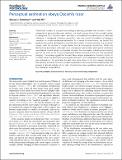| dc.contributor.author | Gershman, Samuel J. | |
| dc.contributor.author | Niv, Yael | |
| dc.date.accessioned | 2013-12-16T19:01:18Z | |
| dc.date.available | 2013-12-16T19:01:18Z | |
| dc.date.issued | 2013-09 | |
| dc.date.submitted | 2013-04 | |
| dc.identifier.issn | 1664-1078 | |
| dc.identifier.uri | http://hdl.handle.net/1721.1/82931 | |
| dc.description.abstract | Theoretical models of unsupervised category learning postulate that humans “invent” categories to accommodate new patterns, but tend to group stimuli into a small number of categories. This “Occam's razor” principle is motivated by normative rules of statistical inference. If categories influence perception, then one should find effects of category invention on simple perceptual estimation. In a series of experiments, we tested this prediction by asking participants to estimate the number of colored circles on a computer screen, with the number of circles drawn from a color-specific distribution. When the distributions associated with each color overlapped substantially, participants' estimates were biased toward values intermediate between the two means, indicating that subjects ignored the color of the circles and grouped different-colored stimuli into one perceptual category. These data suggest that humans favor simpler explanations of sensory inputs. In contrast, when the distributions associated with each color overlapped minimally, the bias was reduced (i.e., the estimates for each color were closer to the true means), indicating that sensory evidence for more complex explanations can override the simplicity bias. We present a rational analysis of our task, showing how these qualitative patterns can arise from Bayesian computations. | en_US |
| dc.description.sponsorship | National Institute of Mental Health (U.S.) (Award R01MH098861) | en_US |
| dc.description.sponsorship | National Science Foundation (U.S.). Graduate Research Fellowship Program | en_US |
| dc.language.iso | en_US | |
| dc.publisher | Frontiers Research Foundation | en_US |
| dc.relation.isversionof | http://dx.doi.org/10.3389/fpsyg.2013.00623 | en_US |
| dc.rights | Article is made available in accordance with the publisher's policy and may be subject to US copyright law. Please refer to the publisher's site for terms of use. | en_US |
| dc.source | Frontiers Research Foundation | en_US |
| dc.title | Perceptual estimation obeys Occam's razor | en_US |
| dc.type | Article | en_US |
| dc.identifier.citation | Gershman, Samuel J., and Yael Niv. “Perceptual estimation obeys Occam s razor.” Frontiers in Psychology 4 (2013). | en_US |
| dc.contributor.department | Massachusetts Institute of Technology. Department of Brain and Cognitive Sciences | en_US |
| dc.contributor.mitauthor | Gershman, Samuel J. | en_US |
| dc.relation.journal | Frontiers in Psychology | en_US |
| dc.eprint.version | Final published version | en_US |
| dc.type.uri | http://purl.org/eprint/type/JournalArticle | en_US |
| eprint.status | http://purl.org/eprint/status/PeerReviewed | en_US |
| dspace.orderedauthors | Gershman, Samuel J.; Niv, Yael | en_US |
| mit.license | PUBLISHER_POLICY | en_US |
| mit.metadata.status | Complete | |
